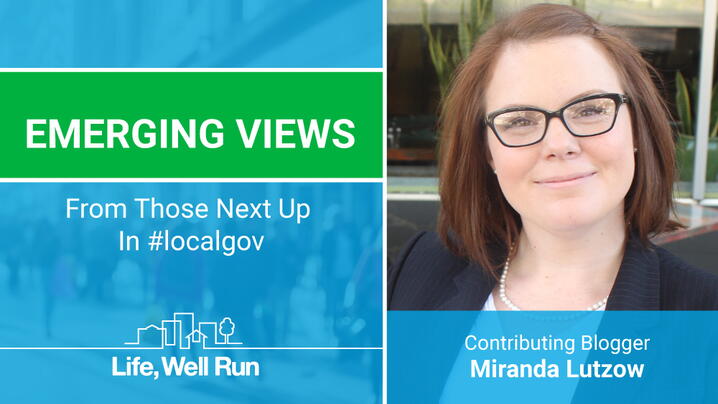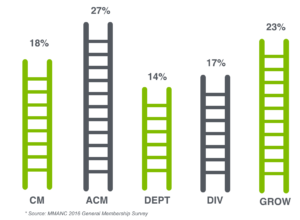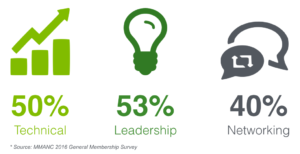
Take a moment and think back to your first job as an adult. What were you looking for? You probably hoped to find a stable job with good benefits in an organization where you could grow, make a decent living, and retire after many years of service.
Well, I’m here to tell you that priorities have changed.
Municipal management is about to go through a really tough period in the next five to ten years. While it’s not exactly the “silver tsunami” predicted 10 years ago, we will still face a shortage of strong candidates to lead our cities, mainly because of the recent recession and managers who delay retirement.
Municipalities need the next generation of leaders to be ready to adapt and respond proactively to the current and future demands of citizens. But what do emerging leaders need? I’ve identified five workplace issues that matter most to emerging leaders when they consider a career move.
Value, Recognition, and Respect from the Manager
My first paid job was working as an executive assistant for the president of a university. I had a boss who didn’t seem to have time to manage me. He was constantly booked solid, running from meeting to meeting, and traveling both domestically and overseas.
I oversaw the person who managed his calendar, and I still couldn’t squeeze myself in. Being in and out of the office, he wasn’t readily available for quick questions or advice, let alone more involved coaching. It was demoralizing, and I was frustrated because without his support and advice, I felt I wasn’t able to grow in my position.
For emerging leaders, this kind of support is essential, because we value growth so highly, and while we may be able to get by, we won’t be able to thrive. That’s why it is so important to have ongoing communication and feedback systems in place.

MMANC members’ response when asked if their supervisor offers professional feedback.
In a 2016 membership survey conducted by the Municipal Management Association of Northern California (MMANC), 74 percent of respondents agreed that feedback is important. However, only 29 percent said their manager always provides feedback. And 6 percent indicated their manager never provides feedback.
Next Gen leaders want to learn and grow in their positions, and the best way we can do that is by receiving direct feedback from our managers.
Fair Treatment Economically and Socially
In order to attract and keep the next generation of local government leaders, organizations will have to change their traditional work practices and reporting relationships.
For example, reward systems based on seniority are not great motivators. They serve only as incentives for people to hang around.
A couple of weeks ago I was sitting in on a panel interviewing a tenured employee for internal recruitment. This person is a good employee but has never really volunteered for additional responsibilities or projects. When the panel asked: “Why do you think you are the best candidate for the job,” the employee looked at the panel with a straight face and said confidently: “I’ve been here 20 years. It’s my time.”
I know that the seniority system was created to reduce the perception of favoritism, and it makes sense that in some situations employees with more experience should lead those with less. But we have to recognize that workplace expectations are changing. Transitioning to an outcome-based reward system encourages performance, not just longevity, and rewards those who give their best to the organization.
Another traditional work practice that needs to change is the inflexibility of work arrangements. Flexible work policies can enhance retention for all career stages and still allow for that much-needed “face time.” Every organization suffers from some level of “presentism”: employees showing up for work but not being fully engaged or productive. This hurts the organization more than a lack of face time. So balance is required depending on your employees’ needs.
We’ve also identified a growing recognition of the benefits of a diverse and integrated workforce: In 1981 only 13 percent of CAOs were women. In 35 years, that number has increased to just over 19 percent. (See this ICMA article on the same topic) As a next generation leader hoping to carve a career path for myself, I take a look around at the number of women managers and it’s hard to be certain that through hard work and consistency, I could be in that position one day.
Opportunities to Maximize the Quality and Quantity of Performance
Emerging leaders place high value on performing efficiently and effectively. Organizations will need to leverage technology, data, and automation to improve the efficiency and effectiveness of government services.
In the most recent MMANC membership survey, 87 percent of respondents agreed that “technology makes me more efficient at work.” However, when 65 percent said their organization does not invest in technology.
And I think that’s pretty typical because of the risk-averse nature of local government. The thought is to let some other agency test and work out the bugs, determine the risk, and gauge community feedback.
Higher-level managers need to remember that the next generation of leaders grew up with modern technology. We shop online, read online, watch online, and date online. Heck – I even met my husband of seven years playing an online trivia game. We regularly try new ways of doing things. So while the organization is waiting for another city to iron out the bugs, staff misses out on using a tool that could really be a game-changer in terms of productivity or service delivery.
But it’s not just that organizations are slow to invest. In many cases, emerging leaders feel they don’t have the technology they need to work most efficiently.
The MMANC survey also asked: Do you use your own technology at work? We found that about 80 percent of next generation leaders have become so accustomed to using the latest technology to improve their productivity in their private lives, they are unwilling to use less advanced tools at work.
Opportunities to Connect and Network
Next Gen leaders recognize the importance and value of collaboration.
Something positive happens when people meet together face-to-face. Thinking and brainstorming together, problem solving together, and assuming responsibility for the organization’s success together is a powerful catalyst for building trust.
Emerging leaders are energized by opportunities to engage, interact, and learn from senior managers. Increased interaction with these subject experts also means that learning is naturally passed on without formal training. Increasing exposure to unrelated departments/functions increases career path opportunities.
Unfortunately, according to one survey, 70 percent of organizations do nothing to bring together early career professionals and senior managers. The other 30 percent provide opportunities through formal and informal mentoring, leadership academies, quarterly meetings, job shadowing, and talent exchanges.
Organizational Investment in Employee Development and Advancement
Serving on the Board for MMANC the past several years, I’ve had the opportunity to meet with many former and current professional managers about leadership development. A retired manager was discussing the importance of developing emerging leaders, and he explained it to me this way: In the last five years of his career, he had a great many leadership development opportunities. Along with his senior managers, he attended conferences, went to team-building exercises, and participated in discussions of leadership styles. As he neared the end of his career, he realized that he had spent more time in training in his last five years than he had in all the first 20 – when he really needed it.
Climbing the leadership ladder brings new roles and responsibilities, new ways of looking at organizations, and new ways of relating to peers and multiple constituents. And like many new managers, he floundered. He avoided conflict. He wasn’t firm enough when he should have been, but then came on too strong trying to compensate. Emerging leaders are looking for organizations that will invest in developing their skills. And it is an investment – the entire community benefits from a well prepared, knowledgeable staff.
As an organization, knowing where current and future skill gaps exist, and having a plan to address them is essential.
When MMANC asked about career goals:
- 17% said division head
- 14% said department head
- 27% said assistant city manager
- 18% said city manager
- 23% said stay and grow within current position.
But when asked what they needed to achieve those goals:
- 50% said increased technical/managerial skills;
- 53% said increased leadership skills
- 40% said increased networking and connections.
So identifying star performers and matching them with opportunities—and then making the investment in those opportunities—is important.
I hear this a lot this: “What if we invest in these employees and they leave?”
But I think the more important question is: “What if you don’t invest in their development and they stay!?”

MMANC members identified these skills as key to growing their careers.
When we asked our membership when they plan to leave their organization, 29 percent said they plan to stay more than six years, and 35 percent said they will stay two to five years (see chart). So investing in skills even for those employees on the lower end of the tenure scale can give the organization confidence that the employee will serve the organization well.
Ideas for Management
So knowing these are these are the top five issues, how can organizations attract and retain Next Gen leaders? My suggestions:
Elected officials can:
- Support organizational structure and policy changes
- Phase out the seniority system
- Invest in, and promote the use of, technology and evidence-based practices
- Support reasonable risk taking
- Ensure robust leadership beyond the manager by making professional development and travel a priority at budget time. This also includes budgets for membership in associations like ICMA and MMANC that provide their members with quality networking, training, and leadership opportunities.
Administrators can:
- Identify the emerging leaders within your organization
- Create more opportunities for new leaders to partner with senior staff
- Increase workplace flexibility policies and practices
- Offer emerging leaders interim assignments or a seat on external committees.
I’m not suggesting all of these changes be implemented immediately, but focusing on a few key initiatives will get your organization moving in the right direction and signal to the next generation of leaders that you are taking steps to meet their needs now and in the future.
Is your organization successful at attracting and retaining up-and-coming talent? Does your city or county have policies and processes that support the needs of the next generation of leaders? If so, I’d love to hear about it! Drop me a line at mlutzow@ci.oakdale.ca.us.
Miranda Lutzow, MPA, is management analyst in Oakdale, California, and a member of the city manager’s senior management team. She is responsible for recruitment and selection, professional development programs, employee health and welfare, and handling personnel matters. Miranda previously served as assistant city clerk in Merced.
She earned an honors Bachelor of Arts degree with a double major in Political Science and Criminal Justice & Public Policy from the University of Guelph in Ontario, Canada, and a Master of Public Administration degree from California State University, Stanislaus. She has spent her career active in several professional organizations, including the Municipal Management Association of Northern California (MMANC), where she has served as Secretary, Membership Director, and 2016 Program Director; and ICMA, where she serves on the Advisory Board on Graduate Education and the Digital Strategies Advisory Board.
New, Reduced Membership Dues
A new, reduced dues rate is available for CAOs/ACAOs, along with additional discounts for those in smaller communities, has been implemented. Learn more and be sure to join or renew today!
